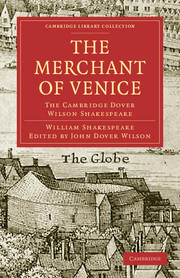THE COPY FOR THE TEXT OF 1600
Published online by Cambridge University Press: 07 September 2010
Summary
The Hayes Quarto (1600), the Jaggard Quarto (1619), and the Folio text
There are three primary texts for The Merchant of Venice:, the Quarto ‘printed by I. R. for Thomas Heyes…1600,’ the Quarto ‘printed by J. Roberts, 1600,’ and the Folio version printed in 1623. The last-named need give us little trouble, since according to the long-standing verdict of scholars it was reprinted from a copy of the Hayes Quarto which had been used as a prompt-book in the theatre or, at the least, had been collated with such a prompt-book; and this verdict, as we shall find (v. pp. 173–177), is fully borne out by a bibliographical comparison of the texts concerned. On the other hand, until about twelve years ago, critics were unable to agree upon the relative authority of the two quartos. Thus, the ‘Cambridge’ editors of 1863 preferred the ‘Roberts’ [i.e. Jaggard] Quarto on the ground that it ‘seems to have been printed by a more accurate printer or overseen by a more accurate corrector’ than the Hayes Quarto, while Dr Furnivall stoutly maintained with Johnson and Capell that the Hayes Quarto was the better of the two. Furnivall appears, however, to have believed with Clark and Wright that the two books were independently printed from the same MS, or from different copies of the same MS, and that the ‘Roberts’ Quarto, though belonging to the same year, was the earlier edition of the play.
- Type
- Chapter
- Information
- The Merchant of VeniceThe Cambridge Dover Wilson Shakespeare, pp. 91 - 120Publisher: Cambridge University PressPrint publication year: 2009First published in: 1926

